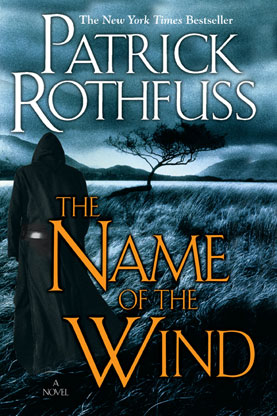This is the kind of book that defies plot summaries. In fact, generally I find that book reviews tend to be better when a little more on the sparse side of plot details. But a few details here and there to give the review structure is best. So how to approach a review for a book like this, where there is no real overarching plot structure?
Perhaps it would help if I mention the most obvious technical detail. Name of the Wind switches between third person and first person. Normally this is a good way to get me to put down a book, since switching between narrative styles like that just doesn't sit well with me. However, Patrick Rothfuss manages to tie the two narrative styles into the same book, by providing a third person frame story, and a first person core story.
The book is essentially the tale of Kvothe, a legendary hero, and some say villain. It follows him, in his own words, from his youth as a wandering Ruh, to his early days in the University. Unlike most epic fantasy novels, there is no overarching plot, no evil to be vanquished, no tyrant to revolt against. There is, essentially, no plot. By all means it should not work. And yet, somehow it does.
Part of the reason it works so well, besides the fact that the book is just plain well written and fun, is that while there is no three act structure plot driving the narrative, Rothfuss instead uses the try-fail cycle to great effect. Things start out well, and then, at no fault to Kvothe, things get bad and they just keep getting worse. Even when things get better, something happens that knocks Kvothe back several pegs. And yet he keeps on moving forward, and thanks to his innate genius he manages to succeed.
Some of the best characters are the flawed, broken characters. People that have the right balance of skills and problems become interesting subjects to read about. Kvothe prescribes to the opposite model of character. He is basically great at everything he touches. He learns pretty much everything faster than everyone else, he is a genius when it comes to music, and he basically succeeds just because he's that good.
Separately the continual beating down of the main character, and the main character succeeding at everything he tries, would be dull and impossible to read through. But when put together they create a fusion that negate each others' flaws. It's essentially a match made in heaven.
That being said, there will be points where this book will be hard to difficult. Kvothe gets beaten down so hard that it becomes painful to read. Not to the point of putting down the book, though there was at least once where it flirted dangerously with that boundary. But even the most trying times in Kvothe's life only make it so that readers are all the more accepting when he finally succeeds. If there are flaws in this book, it works very hard, and succeeds, at covering them up.
With tasteful, yet biting realism not often seen in epic fantasy, Name of the Wind, is a good start to what is hopefully a renewed interest in a genre long neglected by the public.
If you liked my review, Buy the Book Here:
The Name of the Wind (Kingkiller Chronicles, Day 1)
The Name of the Wind (The Kingkiller Chronicles, Day One) (Kindle Edition)


1 comments:
I'm finally getting close to finishing this book. It's really well-written, but it is SO long! I guess that's kind of the point, though.
And yeah, the three-act structure was definitely tossed out the window in this one. The storytelling structure and theme seem to work well together in this book though.
Post a Comment